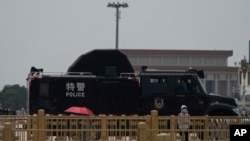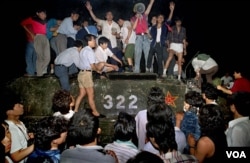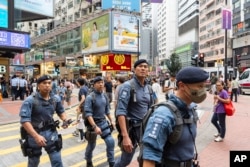Thirty-five years after the Tiananmen Square protests and massacre captured the attention of a shocked world, the children of two victims of China’s 1989 violent crackdown against democracy honor their parents’ legacies.
Zhang Hongyuan, 25, is currently in the Netherlands seeking political asylum. He fled there in April 2023, after authorities in Wuhan of China's Hubei province, threatened to arrest him for his public-interest activism. His advocacy followed the footsteps of his father, Zhang Yi, who was arrested 35 years ago when Chinese authorities put an end to public democratic rallies in Tiananmen Square and in many cities on June 4, 1989. He was then jailed for two years.
Zhang Hongyuan had started a career as a field engineer at the Dapu Power Plant in Meizhou city in Guangdong province. But he found himself on a different path in 2020, when he helped his father spread the word in Wuhan about the outbreak of COVID-19.
Later that year, he worked as a translator for a documentary by dissident visual artist Ai Weiwei. In 2022, Zhang Hongyuan recorded video footage in China of public protests against strict pandemic-related mass civilian lockdowns. His involvement in the White Paper Movement, as the citizens’ public expressions against the lockdowns became known, and another dissident, Yang Min's, act of seeking asylum abroad prompted him to flee China on short notice 15 months ago.
Grace Fang, now 23, immigrated to the U.S. at age eight. She did not learn until she turned 11 or 12 that her father, Zheng Fang, had his legs crushed by a Chinese military tank during the Tiananmen Square violence.
Grace Fang graduated in 2023 from Wellesley College in Massachusetts. Last June, she helped host a San Francisco Bay area event remembering the crackdown.
The Chinese government refers to the events at Tiananmen Square in June 1989 as a "counterrevolutionary riot" and downplays its severity. In China, discussion of the event in media or textbooks of the event is largely forbidden. The authorities regularly harass those at home or overseas who seek to keep the memory of the events alive.
Zhang Hongyuan told VOA he was raised in China by his father and forced to mature early, especially after Chinese Communist Party (CCP) leader Xi Jinping came to power in 2012. Zhang Hongyuan said authorities began to tighten control over the dissidents of the “1989 generation,” which included his father, Zhang Yi.
Frequent police surveillance, house searches and detention had an effect on Zhang Yi, which in turn had an effect on his son.
"When I was a minor, other people's fathers went to the police station to pick up their sons, but I was a son who went to pick up my father. I did this a lot," Zhang Hongyuan said.
"It was precisely these things that prompted me to realize the inhuman side of totalitarian rule at a young age," he said, adding that it gave him the courage to echo the boy on bike during the Tiananmen movement, whose words became famous, and say, "It’s my duty and I have to do something."
Zhang Yi was in Wuhan in 1989 and was attending public rallies in support of students nationwide when he was arrested on June 4. Zhang Yi spent two years in prison, convicted of assembling a crowd to disrupt traffic during that mid-1989 period of democratic expression.
"There was a big black spot on my father's back,’’ Zhang Hongyuan said. “He showed it to me when I was in junior high school and said it was caused by the beating by the guards, as well as the humid environment in the detention center. From that time on, I really began to understand June 4."
About 15 years ago, Zheng Fang and his daughter, Grace Fang immigrated to the U.S. He is now the president of the China Democracy Education Foundation in San Francisco.
Zheng Fang said he is proud that all his three daughters, including Grace who studied American environmental politics and earned a college degree, have a clear understanding of the Chinese Communist government. He told VOA that while Grace Fang has grown up to be an American, she understands the June 4 massacre first-hand and how China's repression had impacted the Chinese people including her family.
Grace Fang told VOA that she admires her father, who is a ‘’hero’’ for standing publicly with the democratic movement in China in June 1989. But as someone who has fewer ties with China now, she can only help translate for her father during talks and presentations at which he shares his experience in China opposing state intimidation.
She said that while she is angered by what happened to her father, she has hope for the Chinese to have a better future.
"Although this historical event [June 4] was very cruel and the government was wrong in many ways, and the human rights situation [in China] was definitely not good, I no longer have hatred, and I just feel sad [about the truth] because I still hope that the Chinese people can have a better future," Grace Fang told VOA.
She said it is important that young Chinese are aware of recent history in China, especially about the Tiananmen Square period, because they have the right to know the truth about their country and government.
With hope, she said, that young Chinese in the future should have the opportunity to participate in their country’s social and political affairs and promote a more open and free China.
Adrianna Zhang from VOA's Mandarin Service contributed to this story.


